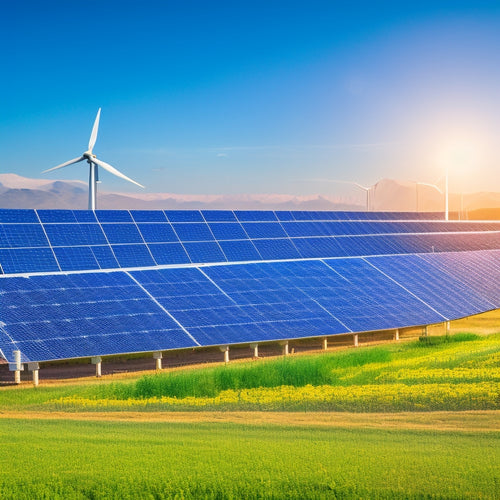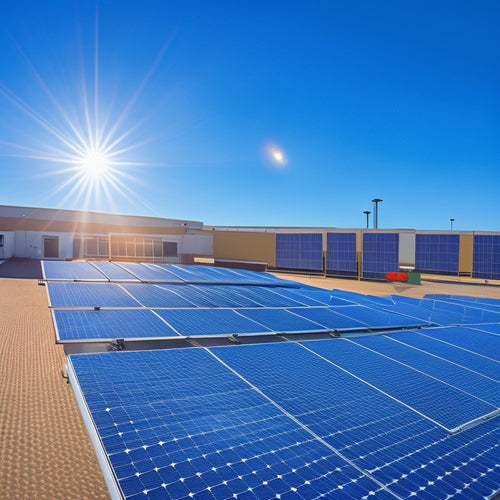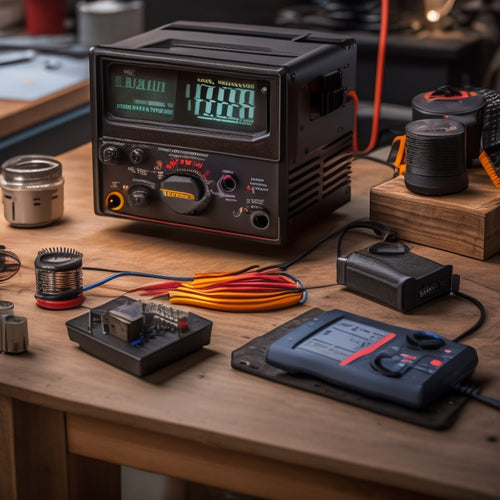
Solar Power Battery Storage
Share
When you consider solar power battery storage, you're investing in a clean, sustainable, and unlimited energy source that reduces reliance on fossil fuels and contributes to a zero carbon footprint. By integrating battery storage, you maximize renewable energy potential, minimize environmental impact, and enjoy increased energy independence. Critical factors for ideal battery performance include deep cycle design, cycle life expectancy, and battery depth rating. Understanding these elements can help you make informed decisions about your energy needs. As you weigh your options, you'll uncover more about the technical specifications and benefits that'll help you utilize the full potential of solar power battery storage.
The Essentials
- Solar power battery storage enables a zero-carbon footprint by reducing reliance on fossil fuels and storing excess energy for later use.
- Advanced battery technology and design, including deep cycle batteries and optimized cycle management, maximize energy storage and lifespan.
- Solar power battery storage provides increased energy independence, allowing homeowners to live grid-free and reduce their vulnerability to outages and rate hikes.
- Battery storage systems ensure a reliable power supply during outages, with advanced management systems optimizing energy usage and storage.
- Longer lifespan guarantees and regular maintenance can extend the life of solar power batteries, making them a cost-effective and sustainable energy solution.
Zero Carbon Footprint Option
You're considering a zero carbon footprint option for your solar power battery storage, which means you'll want to prioritize a renewable energy source.
By utilizing the power of solar energy, you'll greatly reduce your reliance on fossil fuels and lower your carbon emissions.
With a reliable Solar Energy Storage solution, you can alleviate the burden of high energy bills and reduce grid dependence, providing you with greater energy independence and potential cost savings off-grid energy storage.
This approach won't only minimize your environmental impact but also contribute to a cleaner, more sustainable future.
Renewable Energy Source
Renewable energy sources, such as solar power, have become increasingly important as the world shifts towards a zero-carbon footprint.
You're likely aware that traditional fossil fuels are finite and contribute to climate change. In contrast, solar power is a clean, sustainable, and virtually unlimited energy source.
Recent solar advancements have led to significant improvements in energy efficiency, making it more viable than ever. By integrating a battery storage system into your solar setup, you can release the full potential of renewable energy and create a more sustainable, dependable, and cost-effective power solution.
You can now tap into the power of the sun to generate electricity, reducing your reliance on the grid and lowering your energy bills. Solar panels convert sunlight into electrical energy, which can be stored in batteries for later use.
This setup allows you to enjoy a consistent, reliable power supply, even during outages or peak demand periods. By embracing solar power, you'll not only reduce your carbon footprint but also increase your energy independence.
With the cost of solar panels decreasing over the years, it's now more accessible than ever to make the switch to renewable energy.
Carbon Emission Reduction
By integrating solar power battery storage into your energy setup, you take a significant step towards minimizing your carbon footprint. This is because solar power is a clean and renewable energy source that doesn't produce any emissions during operation.
By storing excess energy generated by your solar panels in a battery, you can reduce your reliance on the grid, which is often powered by fossil fuels and contributes to carbon emissions. This, in turn, helps to reduce your carbon footprint and contributes to a cleaner environment.
Additionally, with advanced home power backup systems Energy Storage Systems, you can maximize your renewable energy usage and reduce your reliance on the grid even further.
In addition to reducing your carbon footprint, integrating solar power battery storage into your energy setup also supports sustainable practices. By utilizing the power of the sun and storing it for later use, you're reducing your dependence on non-renewable energy sources and promoting a cleaner, more sustainable future.
Moreover, solar power battery storage can also facilitate carbon capture, as it enables you to store excess energy that would otherwise be wasted, reducing the amount of energy needed from fossil fuels and subsequently lowering emissions.
Increased Energy Independence
You'll achieve greater energy independence with solar power battery storage, which enables grid-free living and a reliable power supply.
By storing excess energy generated by your solar panels, you can power your home or business even when the grid is down.
With affordable solutions like solar energy storage systems, you can find the right fit for your budget.
This means you'll have control over your energy usage and won't be affected by power outages or rate hikes.
Grid Free Living
As the world shifts towards a more sustainable future, one of the most significant benefits of solar power battery storage is the potential for grid-free living, allowing homeowners to increase their energy independence.
With the ability to store excess energy generated by your solar panels, you'll no longer be reliant on the grid to power your home. This means you'll have the freedom to live off the grid, without being tied to traditional energy providers.
Reliable Power Supply
With a solar power battery storage system, your home's energy supply relies less on the grid, providing a reliable power supply even during outages or peak usage periods. This means you'll have consistent access to electricity, even when the grid is down.
The advanced battery management system guarantees that your energy storage is optimized, providing a seamless shift between grid power and stored energy.
During outages, your solar power battery storage system kicks in, providing a reliable power supply to your essential appliances. This isn't just limited to lights and refrigeration; you can power your entire home, including HVAC systems, medical equipment, and communication devices.
With a reliable power supply, you'll experience increased energy independence, reducing your reliance on the grid.
The energy storage system is designed to work in harmony with your solar panel array, storing excess energy generated during the day for use during the night or when the grid is down.
This guarantees you have a consistent and reliable power supply, 24/7. By utilizing the power of the sun and storing it for later use, you'll enjoy increased freedom from the grid and reduced energy costs.
Deep Cycle Battery Design
You'll need to take into account two critical factors when selecting a deep cycle battery for your solar power system: cycle life expectancy and battery depth rating.
To maximize renewable energy storage and reduce reliance on the grid, it's crucial to choose a battery that can handle the demands of your home energy needs solar power system.
When it comes to cycle life expectancy, high-performance batteries can provide a longer lifespan, reducing the need for frequent replacements. Cycle life expectancy refers to the number of charge and discharge cycles a battery can handle before its capacity degrades.
The battery depth rating, usually expressed as a percentage, indicates how deeply the battery can be discharged without damaging it.
Cycle Life Expectancy
Determine the lifespan of your solar power battery storage system by examining its cycle life expectancy, a vital factor in deep cycle battery design.
You want to guarantee your system provides reliable power for years to come, and cycle life expectancy plays a significant role in achieving that. This metric measures the number of charge and discharge cycles a battery can handle before its capacity drops to 80% of its initial rating.
You'll find that different battery chemistries have varying cycle life expectancies. For instance, lead-acid batteries typically last around 300-500 cycles, while lithium-ion batteries can clock in at 3,000-5,000 cycles or more.
Effective cycle management is essential in maximizing your battery's lifespan. This involves monitoring and controlling the depth of discharge, charge rates, and operating temperatures to prevent excessive wear and tear.
When selecting a battery for your solar power storage system, consider the battery chemistry and its impact on cycle life expectancy.
Battery Depth Rating
Your solar power battery storage system's performance relies heavily on the battery's depth rating, a critical aspect of deep cycle battery design. This rating determines how deeply the battery can be discharged before recharging, directly impacting its overall performance and lifespan. A higher depth rating means you can use more of the battery's capacity, resulting in increased energy storage and reduced waste.
When selecting a deep cycle battery, you'll want to take into account the battery chemistry and its corresponding depth rating. For example, lead-acid batteries typically have a depth rating of 50%, while lithium-ion batteries can have a depth rating of up to 80%.
This significant difference in depth rating directly affects the battery's performance metrics, such as its capacity, efficiency, and lifespan.
To guarantee peak performance, it's crucial to match your battery's depth rating to your specific energy storage needs. By doing so, you'll be able to maximize your battery's capacity, reduce energy waste, and enjoy the freedom and independence that comes with reliable solar power battery storage.
Check Battery Depth Rating
When selecting a solar power battery, you'll want to check the depth rating to guarantee it meets your energy storage needs, especially when considering renewable energy systems that require reliable energy storage for homes without grid connectivity.
This is essential because the battery's cycle life expectancy and depth of discharge (DOD) are closely tied to its overall performance and lifespan.
Cycle Life Expectancy
You're likely familiar with the concept of cycle life expectancy, which refers to the number of charge and discharge cycles a solar power battery can handle before its capacity degrades to a certain level. This is a critical factor in determining the overall lifespan of your solar power battery storage system.
Different battery chemistries have varying cycle life expectancies, ranging from a few hundred to several thousand cycles. For instance, lead-acid batteries typically have a lower cycle life expectancy compared to lithium-ion batteries.
Proper maintenance practices can greatly impact your battery's cycle life expectancy. Regular checks on the battery's state of charge, voltage, and temperature can help identify potential issues before they escalate.
Additionally, following the manufacturer's recommended charging and discharging protocols can help prolong the battery's lifespan. By understanding your battery's cycle life expectancy and adopting good maintenance practices, you can guarantee your solar power battery storage system operates efficiently and effectively, providing you with the freedom and independence you desire.
Depth of Discharge
Most solar power battery storage systems are designed to operate within a specific depth of discharge (DOD) range, which markedly impacts their overall performance and lifespan.
As you investigate your battery storage options, it's vital to understand the DOD rating, which reflects the percentage of a battery's capacity that's used during each discharge cycle. A higher DOD means you're using more of your battery's capacity, while a lower DOD means you're using less.
You'll want to choose a DOD that balances your battery usage with its lifespan. A deeper DOD can provide more power, but it may reduce your battery's lifespan. Conversely, a shallower DOD can increase your battery's lifespan, but it may limit your available power.
Discharge rates also play an important role, as faster discharge rates can reduce your battery's lifespan. By understanding your DOD and discharge rates, you can optimize your battery usage, ensuring you get the most out of your solar power battery storage system while maintaining its performance and lifespan.
Longer Lifespan Guarantees
You'll want to contemplate battery life expectancy when evaluating longer lifespan guarantees for your solar power battery storage system.
A reputable manufacturer will typically provide a warranty that covers the battery's capacity to hold a charge over a certain number of cycles or years.
Battery Life Expectancy
Battery life expectancy is a critical factor in solar power battery storage, as it directly impacts the overall performance and cost-effectiveness of the system. You need to take into account the lifespan of your batteries to guarantee you're getting the most out of your investment.
Typically, solar power batteries last between 5 to 15 years, depending on various factors such as usage, maintenance, and quality.
To maximize your battery life, you should follow proper battery maintenance tips. Regularly checking your battery's state of charge, voltage, and temperature can help identify potential issues early on.
Additionally, assuring peak charging efficiency factors, such as avoiding extreme temperatures, minimizing deep discharging, and keeping your batteries away from physical stress, can also contribute to a longer lifespan.
Frequently Asked Questions
Can I Use Solar Power Battery Storage With Existing Solar Panels?
You can connect a battery storage system to your existing solar panels, but first, you'll need to verify solar panel compatibility and consider installation intricacies, such as wiring and inverter configurations, to guarantee seamless integration and ideal energy harvesting.
How Often Should I Maintain My Solar Power Battery Storage System?
You should regularly inspect and maintain your system to confirm ideal performance and extend battery lifespan. Create a maintenance checklist to track tasks, like cleaning connections and monitoring charge cycles, to secure your independence from the grid.
Are Solar Power Battery Storage Systems Safe From Power Surges?
You've likely experienced a power surge from a lightning strike, like the 2011 incident that crippled a California substation. Fortunately, your solar power battery storage system is equipped with power surge protection and advanced battery safety measures, ensuring your energy freedom remains uninterrupted.
Can I Use Solar Power Battery Storage for My Electric Vehicle Charging?
When charging your electric vehicle, you'll want to evaluate the charging efficiency and battery compatibility of your system. Fortunately, many solar power battery storage solutions are designed with EV charging in mind, allowing you to utilize renewable energy for a more sustainable ride.
Are There Any Government Incentives for Solar Power Battery Storage Systems?
You're traversing a treasure map of savings, and government incentives are the X marking the spot! You'll find federal tax credits and state rebates waiting for you, providing a lucrative enhancement to your investment in solar power battery storage systems.
Final Thoughts
As you weigh your options for solar power battery storage, consider the benefits of a zero-carbon footprint. By pairing solar panels with deep cycle batteries, you'll increase your energy independence and reduce your reliance on the grid. But don't overlook the importance of checking battery depth ratings and longer lifespan guarantees. Research reveals that batteries with a higher depth of discharge (DOD) and longer warranties can optimize your energy storage and savings.
Related Posts
-

The Role of Battery Monitoring Systems in Renewable Energy
Battery monitoring systems play an essential role in renewable energy by enhancing system longevity and optimizing pe...
-

Essential Solar Panel Mounts for Commercial Properties
When it comes to essential solar panel mounts for your commercial property, durability and wind resistance are key fa...
-

Key Features of a DC to AC Converter
A DC to AC converter features high efficiency and conversion rates, which reduce energy costs and improve performance...


